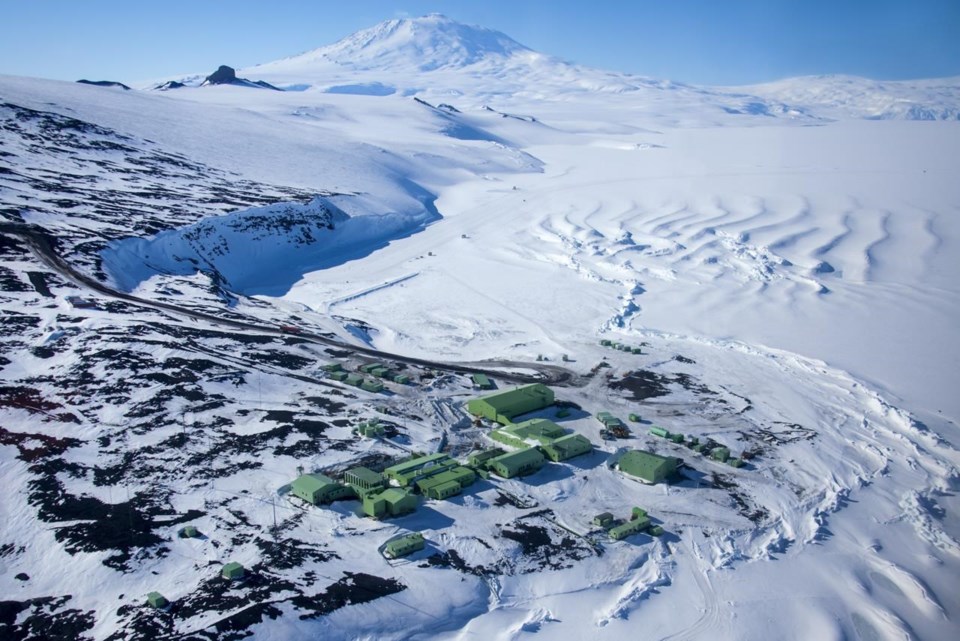WELLINGTON, New Zealand (AP) — Delegations from Russia and Ukraine are among those meeting in Australia this week to decide the future of Antarctica's pristine waters.
Conservationists say new marine protected areas and rules to prevent overfishing are desperately needed, but that Russia could use its veto-like powers to once again block progress.
Achieving the required consensus for action among this diverse group of 27, which also includes China, the United States and the European Union, has always been an immense challenge.
And when two of the members are at war — and relations between China and many Western nations have deteriorated — consensus looms as an even bigger obstacle. Just this month, Russian bombing in Ukraine's capital, Kyiv, partially destroyed Ukraine's Antarctic research center.
Yet despite the enormous political hurdles, some remain hopeful that scientific arguments will win through. The U.S. is paying more attention to the region under President Joe Biden, and this year has sent a relatively high-level delegation led by Monica Medina, an assistant secretary in the State Department.
In an interview with The Associated Press, Medina said Antarctica was “a really fragile, crumbling part of the planet that needs all our help to withstand the challenges we face with climate change.”
The meeting in Hobart in the Australian island state of Tasmania is the first in-person gathering of the Commission for the Conservation of Antarctic Marine Living Resource in three years, after the COVID-19 pandemic kept meetings online.
It comes as New Zealand's Prime Minister Jacinda Ardern makes a rare visit by a world leader to Antarctica, to see firsthand the scientific research taking place and to mark the 65th anniversary of New Zealand's Scott Base.
The two-week meeting in Hobart began Monday with a mass walkout when the Russian delegates started speaking. Kostiantyn Demianenko, who is leading the Ukrainian delegation, said they were grateful for the international support and that Russia had no right to be at the table.
“A state that kills the civilian population, destroys the air and ground civilian infrastructure of another country and defiantly violates the basic provisions of international law should definitely be limited in its right to participate in the activities of international organizations such as CCAMLR,” he wrote in an email.
Still, he acknowledged, Russia remained a member of the group.
He said that back home, Ukraine was trying to rebuild its National Antarctic Research Center in Kyiv, although ongoing drone attacks made that difficult.
"Cracks in the walls, broken windows, destroyed equipment led to the impossibility to use these facilities for work," he wrote.
Russia's delegation did not respond to a request for comment.
Medina said the U.S. backed the walkout because it condemns the war in Ukraine, but it remains hopeful for progress in Hobart.
“Right now, Russia is blocking consensus on adoption of three MPA (marine protected area) proposals, but China is as well,” Medina said. “So we are here trying to work through the issues with both countries. Not one-on-one necessarily, although we will be trying with the People's Republic of China to work through the issues informally.”
She said Russia had been using what amounts to its veto power to block progress not only in Hobart but at a number of international forums.
“It can block consensus. That is a huge impediment to our ability to move forward on some things here, but other things do go ahead in a sort of ordinary course of business," Medina said.
Some hope the group could make progress on other agenda items, including new rules on krill fishing and reaching agreement on fishing for valuable Antarctic toothfish, marketed as Chilean sea bass.
Andrea Kavanagh, who directs the Pew Bertarelli Ocean Legacy Project’s Antarctic and Southern Ocean protection work, said the problem with krill fishing around Antarctica has been that it's almost all concentrated in one small area.
She said the depletion of the small, shrimp-like creatures affects predators including seabirds, penguins, seals and whales. She said the fishery doesn't necessarily need to be reduced, just spread out.
Kavanagh said Norway is the biggest fisher of krill, which is used for human health supplements and feed for aquariums and salmon farms.
“It's not a food security issue,” Kavanagh said. “Krill is used for luxury products.”
Russia last year used its veto-like powers to reject the toothfish catch limits proposed by the commission's scientists. That led to Britain taking its own action by issuing licenses without CCAMLR approval, putting it offside with many other members.
Medina said Britain had been trying to sell some of the toothfish in America but the U.S. had refused to buy it. But she said it was not up to the U.S. to tell Britain to stop its fishing.
She said Britain's fishing was “within the bounds of what had been permitted in the past, and should not in any way be controversial other than the fact that Russia has blocked it.”
One bright spot of the meeting so far has been that discussions with China appeared to have been more positive than in previous years, said Kavanagh. It was also helpful to have high-level support from the U.S. and resume face-to-face discussions, she said.
She pointed out the group had managed before to get Russia on board, back in 2016 when it created a marine protected area twice the size of Texas in the Ross Sea.
Countries should not interpret consensus as a veto power, Kavanagh added, but rather should offer counterproposals so everyone works toward a compromise.
But in recent years, she said, “nobody's offering counterproposals that are legitimate. It's all just ‘No.'"
Nick Perry, The Associated Press



